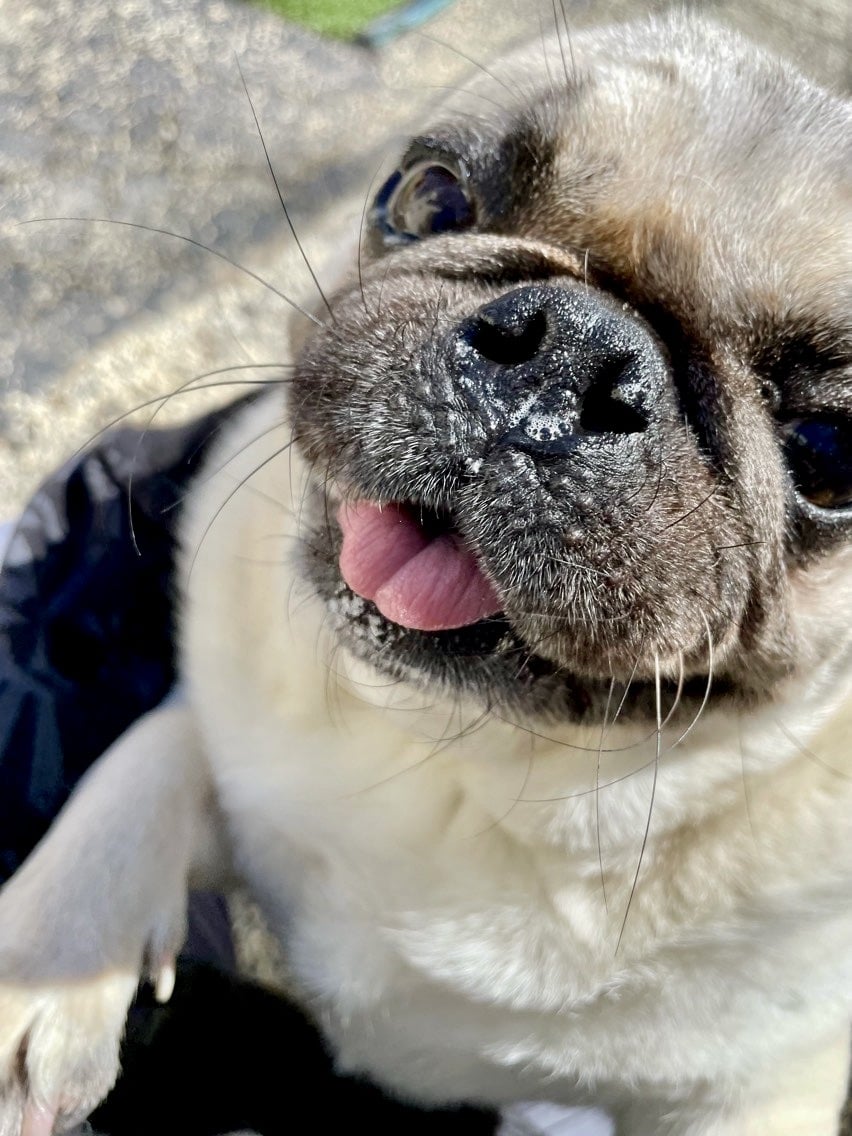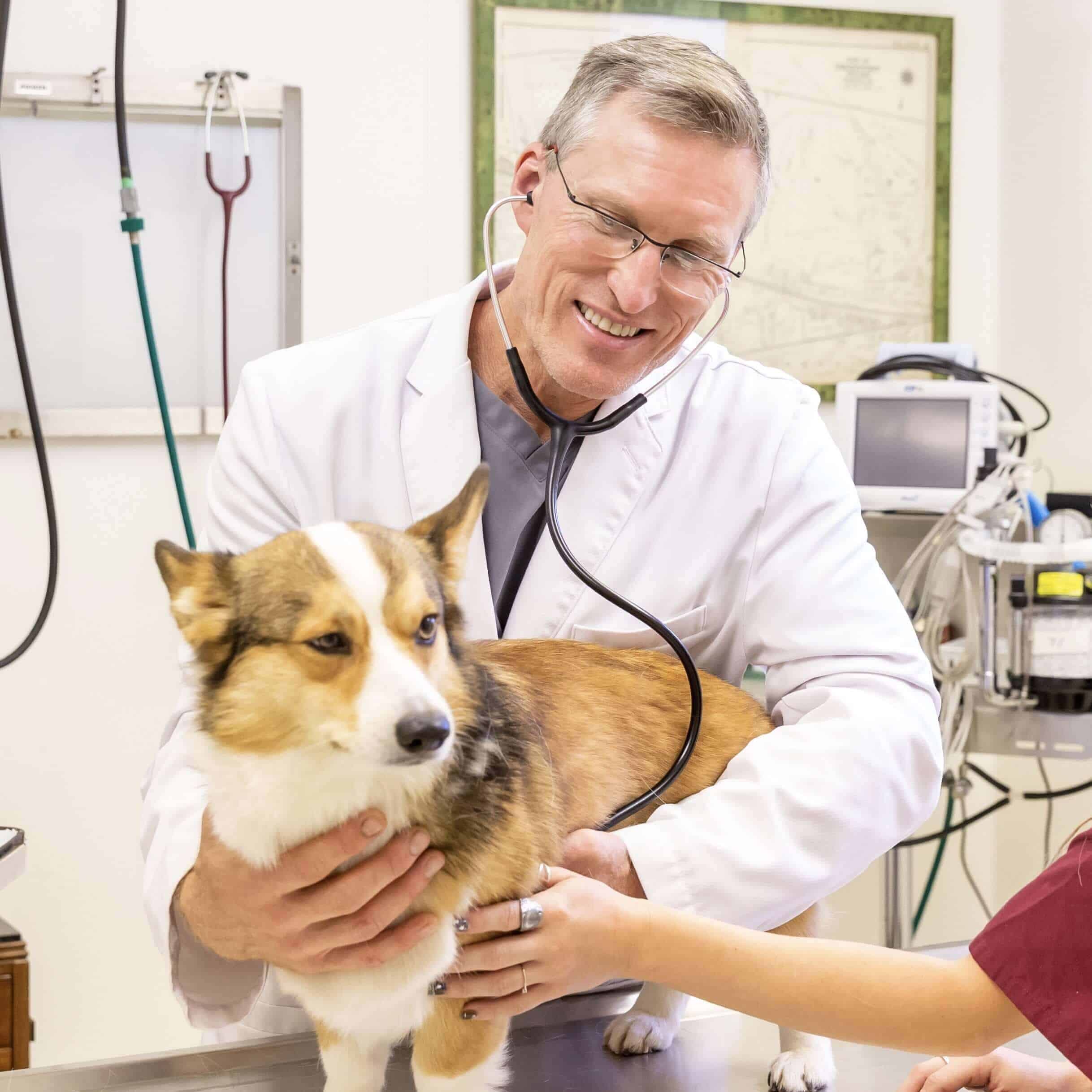The Allergic Reaction Explained
Book NowThe Allergic Reaction Explained
In the typical allergic reaction, a reactive chemical called histamine is released from granules in a cell called a mast cell. The mast cells are stimulated to release this chemical by a protein (which is actually a type of antibody) called IgE.
IgE is specific for certain allergens (which are foreign proteins found in pollens, foods, molds, etc.). When the body is exposed to certain levels of specific allergens, it responds by releasing IgE specific for that allergen.
The IgE then stimulates the mast cells. The mast cells in turn release histamine (“degranulate”) which causes the inflammatory reactions seen in common allergies.
In people, the offending chemical IgE and mast cells, are in highest concentrations in the respiratory tract and mucous membranes (eyes, nose, mouth), but in dogs the concentration is much higher in the skin.
This is why people more often have “hay fever” symptoms and dogs experience itchy skin.

The Treatment — Desensitization
The itchiness and inflammation caused by allergies can be treated by a process called desensitization. It will help control signs of skin and ear problems due to environmental allergens.
When the allergens can’t be avoided — like we can with food allergies — desensitization is the only way to head off the symptoms before they require medical intervention.
Desensitization against allergens is also called allergen immunotherapy (or allergy shots, or allergy drops, depending on how they are administered to your pet).
We treat environmental allergies with an individualized method to target the culprits in your individual pet — each pet’s system is unique.
Desensitization is the process of slowly introducing increasing quantities of an allergen extract to your pet. This can be done using drops in the mouth or injections under the skin.
Environmental allergies usually respond very well to desensitization —70 percent of dogs respond very well to allergy shots, often eliminating the need for other medications the pet may have been given to control signs.
Common Environmental Allergens
Tree pollen – spring and early summer months
Grass pollen – summer months
Weed pollen – summer months, including early fall months
House dust mites – year round, with worsening of signs in fall and
winter months
Molds – year round, with worsening of signs in moist weather
Feathers – may or may not be seasonal depending on source of
exposure
Human dander – year round for indoor pets
How Immunotherapy Works
Immunotherapy works by introducing small amounts of what the pet is allergic to and gradually increasing the dose over time, so that the pet builds a tolerance to these allergens.
This is most often done via injections under the skin, but in some instances is completed via daily drops placed under the tongue (sublingual allergy drops).
Immunotherapy must be continued for at least one year before effectiveness can be determined. During this first year, the pet will also take medication to control the allergic signs.

Benefits of Immunotherapy
About 70% of pets respond positively to the treatment leading to an improved long-term patient quality of life.
Allergy desensitization is a safe and effective treatment and is the only treatment proven to help prevent progression of allergies as pets get older.
It’s a cost-effective treatment option for long-term use compared to chronic administration of medications approved for allergy symptom control.
Many people are stopped by the cost of immunotherapy up front, but if they were to add up all financial costs of the exams, tests, pills, injections, and topical medications that they end up buying to treat the chronic skin and ear issues — plus the physical cost to their pets from the chronic inflammation and infections, then immunotherapy will almost always pay for itself in the long run.
Allergy injections do not cure allergies, but they do help control the symptoms. Allergy injections will likely be necessary for the life of the patient.
Food & Flea Allergy Shots?
Unfortunately, injections for flea bite allergies do not work in most pets.
Strict flea control measures must be implemented for allergic pets and for all other pets in the home.
Food Allergies are unable to be controlled with an allergy vaccine and must be avoided. Any food indiscretion (food or treat outside of the approved ingredients) may result in the return of your pets symptoms.
When Will My Pet Improve?
While some pets improve within weeks, most pets require 6 to 9 months of therapy to see benefit. Some may take one to two years to show improvement.
Many people are stopped by the cost of the testing up front, but if they were to add up all financial costs of the exams, tests, pills, injections, and topical medications that they end up buying to treat the chronic skin and ear issues; plus the physical cost to their pets from the chronic inflammation, irritation, discomfort, and infections from the allergies, then testing will almost always pay for itself in the long run.
The response to the treatment may be complete control of symptoms or there may be partial control. If there is partial control, other medications may still be necessary for control of the remaining symptoms.
During the first few months of the injection program many pets will require additional medications (such as an antihistamine or low doses of a cortisone drug) until control is achieved.
As the allergy injections take effect and as the symptoms subside, these medications should be gradually reduced/weaned.

Monitoring Your Pet After Treatment
Most animals adapt to receiving allergy shots readily and adverse reactions to the allergy vaccine are rare.
Reactions are generally mild, but should always lead to a discussion with your veterinarian before you give the next dose.
If you notice any of the following, make sure to note it on your workbook and call Paoli Vetcare.
Common reactions to immunotherapy include:
• Inflammation at the site of the injection
• Increase in itchiness and redness
Extremely rare reactions include the following and require that you contact your pet’s doctor immediately:
• Collapse
• Diarrhea
• Difficulty breathing
• Facial swelling
• Hives
• Excessive salivation
• Vomiting
• Weakness
Please remember that allergies also can change with age, so the results of one test may not be the same years later as new allergies can develop with time.
If a patient that has been doing well on injections for a period of time develops symptoms again, it is often recommended to retest to be sure a new allergy has not developed. If one has, then the serum for the injections needs to be changed.
Dog Breeds with Hereditary Allergies
Due to the hereditary nature of the disease, several breeds, including mixed breed dogs can have atopic dermatitis, especially most terriers, Golden Retrievers, Irish Setters, Lhasa Apsos, Dalmatians, Bulldogs, and Old English Sheep dogs. Here is a comprehensive list of dogs that may inherit dog allergies:
• Boston Terrier
• Boxer
• Bull Terrier
• Cairn Terrier
• Chihuahua
• Chinese Shar-Pei
• Cocker Spaniel
• Dalmatian
• English Bulldog
• English Setter
• German Shepherd
• Golden Retriever
• Gordon Setter
• Irish Setter
• Jack Russell Terrier
• Labrador Retriever
• Lhasa Apso
• Miniature Schnauzer
• Pug
• Scottish Terrier
• Shih Tzu
• West Highland White Terrier
• Wirehaired Fox Terrier
• Yorkshire Terrier
Are you ready to come see us?
Request an appointment online in minutes! Click the button below to get started.
What Our Customers Say
My dog ate about three boxes of Girl Scout cookies a few nights ago and Dr. Dawn has been so great about checking in as he works the cookies, plastic, and box out of his system. I highly recommend Paoli Vetcare and thank them for taking such great care of my sweet boy!
The ongoing care for Regina has been outstanding. Dr. Dawn listens and addresses our concerns in dealing with a difficult cat and trying to find ways to treat her without increasing all of our stress levels.
We have worked with Dr. Rowan for many years through various pets. He is always thoughtful, reasonable, and professional. We have the utmost respect for his opinion and the way he goes about his work.
Meet Our Team of Vets for Phoenixville, PA

Jay Rowan, VMD

Dr. Erin Downes
Dr. Erin Downes is a pet enthusiast and an educator and one of Paoli Vetcare’s greatest strengths. A lifelong lover of animals, Erin has spent three decades putting pets first.



